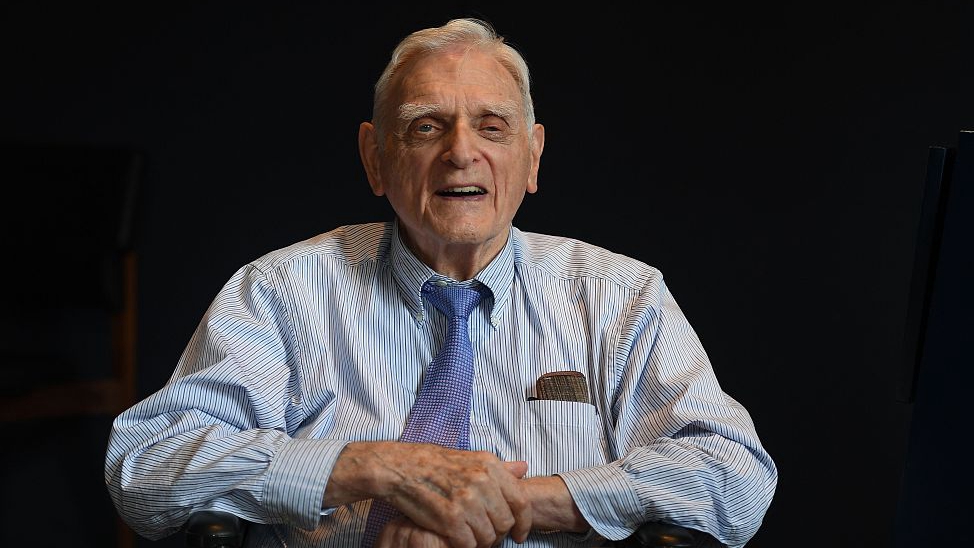Ottawa widens pathways for attracting tech talent
The Canadian Press
Tue, June 27, 2023

TORONTO — Ottawa wants to draw more tech talent to Canada and is expanding the pathways workers in the sector have to enter the country.
Immigration Minister Sean Fraser revealed the Tech Talent Strategy, which includes a new, dedicated pathway for permanent residents targeting employees and workers in the science, technology, engineering and mathematics (STEM) sectors.
"There’s no question ... that we are in a global race for the same pool of talent with competitors around the entire world," he said at the Collision tech conference in Toronto on Tuesday.
"In my view, Canada’s winning that race and we might be winning it, but I think we can win it by an even larger margin."
To win that race, he said the government is streamlining how it prioritizes applications to its startup visa program after allocating more spots for 2023.
It is also extending the length of work permits given out to entrepreneurs through the program.
Applicants can apply for three-year open work permits instead of one-year permits limited to the applicant's own startup, and the permit will be available to each member of an entrepreneurial team instead of only the most essential, the government said in a press release.
"For those who are in the queue, we’ve got good news," Fraser said.
"We’re also going to issue open work permits for three years for them and their families to be in Canada while they wait for their applications to be completed."
Further increases to the number of spots in the startup visa program are planned for 2024 and 2025, and the government is prioritizing applications supported by venture capital, angel investor groups and business incubators.
As part of the changes Fraser announced, the government is creating an open work permit stream for H-1B visa holders in the U.S. to come work in Canada, and is developing an innovation stream under the International Mobility program to attract talent.
It has also fixed pandemic processing delays for its Global Skills Strategy program, Fraser said, promising to process work permits in just two weeks.
The final piece of the project is a digital nomad strategy allowing people working for foreign companies to stay in Canada for up to six months — and if they get a job offer while in Canada, the government will allow them to stay and work here, said Fraser.
The moves come as a wave of layoffs have hit the tech sector as investor exuberance in the sector faded when consumers returned to pre-pandemic habits, pushing valuations down.
Companies as big as Meta, Amazon, Google and Shopify have made cuts along with Wealthsimple, Clearco, Clutch and Ritual.
Layoffs aggregator Layoffs.fyi has counted 210,871 people laid off across the globe at 800 tech companies so far this year. It counted 164,709 cut from 1,058 last year.
Asked why the government was easing pathways to immigration as so many workers have lost their jobs, Fraser said it's because Ottawa is taking a long-term approach.
"There's no question in my mind, having more talented tech entrepreneurs and professionals in this country is going to be a very good thing half a generation from now," he said at a press conference.
"And on the flip side of that coin, if we choose not to embrace the opportunity that this moment represents, we're going to miss out on what could be a generational opportunity to pursue economic growth in a sector of strategic importance to Canada."
He added that when he talks to people in the sector about immigration, the No. 1 obstacle they mention is finding the talent needed to help their businesses scale.
If Canada opens pathways for workers to come, Fraser said it can build a workforce with professionals, including those laid off, who can move laterally to fill jobs and encourage others to head to the country.
"We're actually going to be creating a pool of talent that's going to set the stage for more companies to call Canada home in the long term."
— With files from Rosa Saba
This report by The Canadian Press was first published June 27, 2023.
Tara Deschamps, The Canadian Press
READ A NOVEL
‘People reading more self-help books amid cost-of-living crisis’
Alan Jones, PA Industrial Correspondent
Wed, 28 June 2023

People are reading more books about self-help and social and economic issues compared with previous years, in view of the cost-of-living crisis, new research suggests.
A survey of 2,000 adults found that four out of five are reading books and half listen to audiobooks.
More than a third of respondents said they turn to literature about people experiencing adverse times more now during a cost-of-living crisis compared with previous years.
The Reader, a charity providing mental wellbeing support to communities through weekly Shared Reading groups, said its report is being released as more people risk being pushed into poor mental health due to the financial stress of the cost-of-living crisis.
Katie Clark, The Reader’s director of literature, said: “The financial stress of the ongoing cost-of-living crisis is putting more people at risk of poor mental health while, in many places, the support services they need are struggling to cope with demand.
“This calls for a reframing of the conversation around cost of living that highlights the urgent need for more spaces where people can find social support, alongside priorities like warm spaces and food banks.”
Cornish Lithium races to avoid collapse with £10m fundraising drive
Oliver Gill
Mon, 26 June 2023

Cornish
The company at the centre of the “Klondike of lithium” in Cornwall has just weeks to find £10m of new funding to avoid collapse.
Cornish Lithium needs to secure a capital injection by the end of July “to ensure the business can meet its financial commitments”, the company said in its annual report.
The business has been linked with playing a central role in reviving the fortunes of UK car building with hopes that it can produce enough lithium to help fuel plants manufacturing electric vehicles.
Then-prime minister Boris Johnson hailed Cornwall in 2021 as the “Klondike of lithium” and raised the possibility of a gigafactory being built in the county.
However, Cornish Lithium needs more money ahead if it is to start production in 2026.
The company received £18m from investment metals investor TechMet in 2021. A US government-backed investment company has also injected capital.
But just weeks before an end-of-July deadline, Cornish Lithium’s accounts – signed on June 5 and filed last week – revealed the parlous state of its cash reserves.
The company said: “At the time of signing this report, the extent and timing of this funding were uncertain, however discussions are progressing well and management are confident that an agreement will be reached in good time to allow the group to meet its short-term commitments.”
Bosses continued that Cornish Lithium is also in advanced negotiations with new investors to facilitate “medium to long term funding for the group’s projects”.
Even if the £10m in short-term funding is agreed, if the company cannot secure medium to long term investment from new investors, “the group would be required to implement mitigations to reduce planned spending”.
In Cornish Lithium’s annual report, Ian Cockerill, the chairman, blamed the Government for failing to offer taxpayer-funded incentives to match those offered to companies in the US and the European Union.
He said: “The UK is currently being left behind in this global race to secure the industries that will drive the energy transition to renewable power and the electrification of transport.
“The automotive sector and related industries are a key component of the UK’s GDP and the damage that a diminished or, worse still, a disappearing UK motor sector will cause the UK economy is potentially enormous.
“The lack of an industrial strategy has left the UK at a significant disadvantage in the race to build electric vehicles.”
SCOTLAND
Stirling University lecturers to walk out over 50% marking boycott pay deduction
Rebecca McCurdy, PA Scotland Political Reporter
Mon, 26 June 2023

Stirling University lecturers are to commence a three-day walkout after their pay was docked by 50% for participating in a marking and assessment boycott over pay.
Students have previously voiced concern that their degrees could be devalued as members of the University and College Union (UCU) refuse to mark exams or assessments in a dispute with the University and Colleges Employers Association (UCEA).
It has seen academics at 145 universities across the UK take part in the marking boycott since April 20, with the union vowing to continue until an improved offer is made.
But Stirling academics have said half of their pay is being deducted as a result of taking part in the boycott.
Lecturers are still working their normal hours at the university and providing support for students, UCU Scotland has said, however the union argues the wage deduction does not reflect the percentage of time staff spend marking and assessing work.
Now, the union has announced lecturers in Stirling will walk out on Tuesday before returning to teaching on Friday June 30.
It follows similar action taken by Edinburgh, Dundee and Queen Margaret universities.
Mary Senior, UCU Scotland official, said: “Staff choose to work in universities because they want to teach and support students.
“The very last thing staff want to do is take industrial action, but over 10 years of pay being held down and worsening conditions has left us with no option.
“The principal at Stirling, Gerry McCormac, should stop trying to circumvent lawful industrial action short of strike and join the increasing number of principals and vice-chancellors calling for new, meaningful talks to resolve the dispute.”
Last week, higher education minister Graeme Dey said the marking boycott was “regrettable” after it emerged some students will graduate from university without knowing their degree results.
Raj Jethwa, chief executive of UCEA, said: “Policies on withholding pay are clear and factual, communicated to staff, and aimed at protecting students. HE institutions have a duty to protect their students and so they reject partial performance and – as UCU knows – they are legally entitled to withhold full pay for partial performance of duties such as MAB.
“HE institutions respect employees’ right to take lawful industrial action and, in turn, UCU needs to respect the employers’ right to withhold pay for not fulfilling contracts. Each autonomous HE institution is of course fully focused on managing this period of potential disruption as best they can for their students. We are disappointed that UCU is encouraging its members to target students.”
A Stirling University spokesperson said: “The university is disappointed that this additional strike action is taking place.
“Our focus is on ensuring all our graduating students and their guests can celebrate and enjoy their graduation day, and we are grateful to all those staff across the institution who have worked hard to make this happen.
“A small number of staff continue to participate in the marking and assessment boycott, as part of sector-wide industrial action.
“Marking and the facilitation of assessments form part of the contractual duties of teaching staff. Staff who are not fulfilling their contractual obligations will have part of their pay withheld.”
Meanwhile, members of the Educational Institute for Scotland (EIS) at Edinburgh College began industrial action in response to compulsory redundancies.
The union’s general secretary, Andrea Bradley, said members were left with “no option” in the face of “wilful intransigence by the management of the college”.
The college rejected the appeal of one member of lecturing staff who faces redundancy from Friday.
She added: “Given the size and scope of Edinburgh College as an organisation, the EIS would have anticipated meaningful discussions and offers of retraining or upskilling for the colleague who faces unemployment as of Friday.
“Despite retraining or upskilling being raised on several occasions by EIS representatives, and despite a so-called recruitment freeze having been abandoned, these discussions have not taken place, thereby limiting suitable alternatives to redundancy for the colleague who also happens to be an EIS branch rep.”
An Edinburgh College spokesperson said: “The college continues to hold talks with our local EIS-Fela (Further Education Lecturers Association) branch and to explore all suitable alternative employment opportunities in this case.”
Nobel laureate and battery pioneer John Goodenough dies at 100
CGTN

John Goodenough attends a press conference at the Royal Society in London, October 9, 2019. /CFP
Nobel laureate John Goodenough, a pioneer in the development of lithium-ion batteries that today power millions of electric vehicles around the globe, died on Sunday just a month short of his 101st birthday.
The American was "was a leader at the cutting edge of scientific research throughout the many decades of his career," said Jay Hartzell, president of the University of Texas at Austin, where Goodenough was a faculty member for 37 years.
Goodenough was 97 when he received the 2019 Nobel Prize for Chemistry – along with Britain's Stanley Whittingham and Japan's Akira Yoshino, for their respective research into lithium-ion batteries – making him the oldest recipient of a Nobel Prize.
"This rechargeable battery laid the foundation of wireless electronics, such as mobile phones and laptops," the Royal Swedish Academy of Sciences said on making the award.
"It also makes a fossil fuel-free world possible, as it is used for everything from powering electric cars to storing energy from renewable sources."
In recent years, Goodenough and his university team had also been exploring new directions for energy storage, including a "glass" battery with solid-state electrolyte and lithium or sodium metal electrodes.
Goodenough also was an early developer of lithium iron phosphate (LFP) cathodes as an alternative to nickel- and cobalt-based cathodes. LFP is rapidly overtaking more-expensive nickel cobalt manganese in electric vehicle batteries, experts say, because it uses materials that are more abundant and sustainable at a much lower cost.
He was born on July 25, 1922, in Jena, Germany, to American parents. After completing a bachelor's in mathematics at Yale University, Goodenough received a master's and a PhD in physics from the University of Chicago. He became a researcher and team leader at the Massachusetts Institute of Technology and later headed the inorganic chemistry lab at the University of Oxford.
Source(s): Reuters
UK considers using new international rules to crack down on greenwashing
Rebecca Speare-Cole, PA sustainability reporter
Mon, 26 June 2023

The UK is considering adopting new rules aimed at clamping down on corporate greenwashing.
The International Sustainability Standards Board (ISSB) – a group set up at Cop27 to set global rules on climate reporting – published its inaugural standards on Monday to help countries regulate companies’ green claims.
Under the rules, firms would face more pressure to publicly disclose their impact on the climate including on their Scope 3 emissions – which covers the products or services that they sell.
The ISSB says the aim is to establish a common global language in which companies report their impact, to improve trust in climate reporting and to help to inform investors about sustainability-related risks and opportunities.
Speaking at the launch event on Monday, ISSB chair Emmanuel Faber said individual countries can decide whether listed companies must apply the new rules.
The UK is among the countries considering their use, alongside Canada, Japan, Singapore, Nigeria, Chile, Malaysia, Brazil, Egypt, Kenya and South Africa, according to the ISSB.
The London Stock Exchange and the Financial Conduct Authority (FCA) – the UK’s financial watchdog – have both welcomed the new standards with the latter having worked closely with the ISSB on the new rules.
Mr Faber told the PA news agency: “We have been really encouraged by the number of jurisdictions that have already indicated they will consider adoption.
“The UK has been instrumental in paving the way for sustainability reporting for investors and advising on the development of ISSB standards.
“We launched our standards today at the market opening of the London Stock Exchange, as well as at other exchanges around the world, and we have been in close dialogue with the UK FCA which is highly supportive of our objective to establish a common language for investors globally.”
The ISSB is part of the independent International Financial Reporting Standards Foundation, which writes standardised accounting rules used in around 140 countries.
It says the new rules on sustainability-related reporting can be released alongside firms’ annual financial reports from 2024.
Sacha Sadan, director of ESG at the Financial Conduct Authority, said: “We have been working closely with the ISSB since the start and are hugely supportive of its mission to create a common, global language for companies around the world to communicate their sustainability stories in a consistent and comparable way.
“That is why we are delighted to see the final standards launched today.”
Jane Goodland, group head of sustainability at the London Stock Exchange Group (LSEG), said: “Corporate disclosure of basic metrics such as carbon emissions vary significantly based on size, sector and location and has not improved materially in recent years.
“This is impeding those investors wishing to allocate capital based on sustainable investment objectives.
“We encourage policymakers to adopt the ISSB’s new standards as this global baseline by 2025.”
Pankaj Bhatia, director of Greenhouse Gas Protocol at the World Resources Institute, said: “The ISSB’s requirement to disclose Scope 3 emissions is a major step forward in measuring and managing emissions from companies’ value chain.
“This is the first time a major global standard setting institution required reporting of Scope 3 emissions, setting a precedent for other institutions and regulatory programmes to follow.”
Financial services giant PwC welcomed the new rules but added that high quality standards alone are not enough.
Gilly Lord, global leader for public policy and regulation at PwC, said: “Companies need to use them to produce high-quality sustainability reports.
“It is important that investors, jurisdictions, listing authorities, companies and others consider how to incentivise adoption so there is a level playing field of comparable information.”
She added that climate change is not the only area where investors and stakeholders need more reliable, comparable disclosures of non-financial information.
“So we encourage the ISSB to pursue its plan to go beyond climate and prepare standards with specific disclosure requirements focused on other sustainability areas,” she added.
PA has contacted the UK Treasury for comment.
UK
Freeze to housing benefit threatens landlords too
Alexa Phillips
Mon, 26 June 2023

Buy to Let
Landlords will be forced to sell up because of a freeze in housing benefits and worsen a burgeoning rental crisis, property investors have warned.
A combination of soaring rents since the pandemic and a freeze in housing welfare means tenants are finding it increasingly difficult to afford their housing costs, according to the Institute for Fiscal Studies.
Just one in 20 private rental properties can be paid for via “Local Housing Allowance” (LHA) rates – the lowest level on record, a report by the think tank found.
The rates, which are used to calculate the maximum amount people renting from a private landlord can claim in housing benefits or Universal Credit, have not been updated since March 2020, when they were raised to cover the rent for the cheapest 30pc of properties in each local authority.
Since the freeze, rents for new tenancies have surged by more than a fifth on average, according to the analysis of data from property website Zoopla.
The proportion of properties now covered by LHA rates has plummeted from 23pc to 5pc.
Housing benefits are a crucial income source for landlords as they are used by nearly two-fifths (38pc) of renters – or two million households.
It puts affected landlords between a rock and a hard place: leaving them with the choice of raising rents to pay for rising mortgage bills, knowing their tenants may be unable to pay and forced to vacate, or keep the rent as is and fund increases to their mortgages via other means.
Chris Norris, of the National Residential Landlords Association, warned the benefits freeze could push landlords to sell up, potentially reducing rented housing stock and pushing up rents further still.
He said: “We speak to landlords every day telling us their mortgage rates are going up – their rent isn’t even covering their mortgage costs but they know their tenants can’t sustain the increase they need to apply.
“They’re trying to assess whether this is another short-term blip and we will get back to a semblance of normality, or whether they have to sell that property because they don’t feel that rent is sustainable.
“It’s more acute when you have a tenant that has a fixed income because of the benefit freeze and they know the shortfall they’re asking them to take up is even more extreme.”
The rising cost of borrowing has squeezed landlords’ yields and comes on top of the removal of valuable tax breaks and the imposition of costly home efficiency requirements.
Tom Wernham, research economist at the Institute for Fiscal Studies and co-author of the report, said: “If these benefit freezes are maintained, private rents will become increasingly unaffordable for those on low incomes.”
He said the properties covered by benefit rates are of “lower quality” and are more expensive to heat than average.
Darren Baxter, principal policy adviser at the Joseph Rowntree Foundation, said private renters are seeing the number of homes they can afford “shrink dramatically”.
He said: “The Government’s freeze on local housing allowance is unsustainable.
“Even if renters can find somewhere affordable to live, it’s likely to be a home that’s unsafe or in disrepair. These homes are also harder to heat, leaving renters facing energy bills they just can’t afford.”
Properties that are covered by LHA rates have 19pc higher heating and hot water costs than average, the report said.
Around a quarter of private rented homes lived in by low-income people are hazardous, in disrepair, are difficult to adequately heat or lacking in modern facilities, compared with just 18pc of owner-occupied homes and 12pc of social rented homes.
Younger lower-income people are also much more likely to be renting privately compared with previous generations amid falling home ownership rates.
Wales has the worst affordability of any region across Britain, with only 2.5pc of rents covered by LHA rates.
The North East fares best but still only 6.9pc of homes are covered.
Blue sky thinking: How workplace jargon is alienating younger workers
Lydia Smith
·Writer, Yahoo Finance UK
Mon, 26 June 2023

Why is workplace jargon so unpopular — and why can it alienate some workers? Photo: Getty
If you’ve ever heard the phrase ‘blue sky thinking’ or been asked to ‘circle back’ on something, you may have rolled your eyes. Work jargon — or corporate speak — can easily get on your nerves, but research shows it can also have a detrimental effect on how included people feel at work, especially hybrid and younger workers.
According to recent research by LinkedIn, a quarter of hybrid workers believe ‘workplace jargon’ is stopping them from feeling like they belong at work. Of those surveyed, 60% of millennials said they are keen to get rid of it entirely.
To feel included in the workplace, hybrid employees are changing the way they speak to fit in. Of those surveyed, 41% said the use of ‘workplace jargon’ makes them feel less involved in the workplace, with half (51%) having altered the way they’re speaking to fit in.
So why is workplace jargon so unpopular — and why can it alienate some workers?
Business speak is vague
Phrases like ‘touch base’ and ‘in the loop’ are nothing new and still commonly used in the workplace. However, with the rise of remote and hybrid working as a result of the COVID-19 pandemic, the way we communicate at work has changed.
When communicating virtually via Teams or video calls instead of face-to-face conversations, effective communication is even more important so we know what work is being done by others. However, workplace jargon can be vague and often relies on interpretation, which can cause confusion and create a disconnect between colleagues.
Read more: Why AI is making anxiety worse in the workplace
When using jargon, it’s easy for information to be misunderstood. According to LinkedIn, 40% of workers say they’ve had a misunderstanding or made a mistake at work because they didn’t know the meaning of workplace jargon or misused it.
A review of literature about business jargon in the American Journal of Industrial and Business Management found that it impedes a company’s daily communication and success. Not only did it affect individual and general productivity, it also lowered profit margins — and made employees feel like they were looked down on by others.
“The use of workplace jargon creates feelings of isolation for hybrid workers, particularly amongst younger generations,” says Becky Schnauffer, head of global clients at LinkedIn Talent Solutions.
“With our data showing that hybrid roles are on the rise, it is more important than ever for HR teams to consider how they can create and foster an inclusive workplace.”
Generational gap
Much of the workplace jargon we hear now emerged during the 1980s, such as ‘low-hanging fruit’ (low effort tasks with a high positive result). While older workers may be au fait with ‘shooting from the hip’ to gain a competitive edge, younger workers, including millennials and Gen Z, may not.
Ultimately, this kind of speech can create a disconnect between different generations, especially if younger workers feel embarrassed about not understanding certain phrases.
Read more: Why pushing employee resilience may do more harm than good
However, research shows it isn’t just younger workers who don’t understand business speak — and that using plain language is socially and economically beneficial.
The LinkedIn study found professionals with English as a second language said the process of learning workplace jargon was stressful, slowed down productivity and made them feel left out of conversations.
Jargon negatively impacts trust
Business jargon is often used to veil what speakers really mean. For example, when someone is ‘let go’, it’s a softer way of saying they’ve been made redundant or fired. Because of this, jargon can undermine trust in workplaces.
In a study of internal communication among Italian businesses, jargon was linked to hierarchical communication, or communication that changed depending on corporate levels and structures. In other words, it is often used by people who want to sound more authoritative or powerful.
However, business jargon or abstract language tends to do the opposite. Not only is it less believable, it is usually perceived as pretentious rather than impressive. Meanwhile, clear information that doesn’t contain jargon has been linked to positive attitudes and trust among employees and employers.
Read more: Have Zoom calls affected our ability to communicate in-person?
Crucially, jargon can be a barrier to job seekers considering a new role. According to LinkedIn, half (51%) of hybrid employees in the UK have said overuse of ‘workplace jargon’ in a job advert has put them off applying.
So if employers want to hire and retain employees — and ensure all workers are connected and happy — it may be better to crack down on the business speak for good.
‘If artificial intelligence creates better art, what’s wrong with that?’ Top Norwegian investor and art collector Nicolai Tangen
John Collingridge
Tue, 27 June 2023

Photograph: Graeme Robertson/The Guardian
For a prolific art collector, Nicolai Tangen is remarkably relaxed about the prospect of masterpieces created by robots. The threat of AI-made paintings, impossible to distinguish from human brushstrokes, has sparked soul-searching and paranoia in the art world, but not with Tangen.
“Hey, if it creates better art that’s fantastic,” says the Norwegian philanthropist, art historian and boss of the world’s biggest sovereign wealth fund. “If you create something which is even more aesthetically pleasing, what’s wrong about that?”
Tangen’s own gallery, a converted grain silo in the Norwegian seaside resort of Kristiansand, will open later this year to display one of the world’s biggest collections of Nordic modernist art. Tangen has amassed more than 5,000 works by 300 artists. Originals and copies will hang side by side. “There are a couple of cases where we think the art is really beautiful. And we basically made a copy of what we had and hung it there instead. Is it less beautiful to look at? No it’s not. So it’s just about the mindset you have.”
We will have a lot of stranded assets because of AI, if you’re on the wrong side of that you will be decimated quickly
Tangen is less relaxed about the impact artificial intelligence will have on the more than 9,000 companies that the £1.1tn Norwegian sovereign wealth fund – colloquially known as the oil fund – invests in. The wave of disruption has already started scything through the stock market: last month almost £1bn was wiped off the value of the educational publisher Pearson after a US rival warned of a significant spike in student interest in ChatGPT, the generative AI program.
“AI is so unbelievably huge. Bill Gates says it is more important than the computer, internet and so on,” Tangen says. “We will have a lot of stranded assets because of AI, because if you’re on the wrong side of that you will be decimated quickly. So I think over the next couple of quarters we’re going to start to see victims of this; share prices will be creamed. This is so fast.”
Tangen is deploying AI across the fund, using predictive models to reduce the 36m trades that it does every year – central to his target of improving the fund’s efficiency by 10% a year. He wants to see “proper, worldwide regulation” so that AI is developed ethically. “How can you make sure that it’s not disadvantaging you because of race or those kinds of things?” he says.
Tangen, 56, barrel-chested in an open-necked blue shirt, is sitting in the Mayfair offices of Norges Bank Investment Management (NBIM), the investment arm of the Oslo-based sovereign wealth fund.
The fund was built on Norway’s decision to invest its North Sea oil and gas revenues into a fund to benefit its citizens in perpetuity, following the discovery of a vast offshore oilfield in 1969. That decision (which the UK failed to copy with its own North Sea gas wealth), has paid off handsomely since the first proceeds were deposited in the fund in 1996.
A ticker on the fund’s home page climbs by the second. It owns 1.4% of the world’s listed companies and Tangen uses that influence at shareholder votes – and by quizzing the bosses of those companies on his podcast, In Good Company.
The fund recently chastised the US oil companies ExxonMobil and Chevron, backing motions from the climate activist group Follow This at their shareholder meetings urging them to do more to tackle the climate crisis. But notably it also backed BP’s board, despite its boss Bernard Looney’s decision to water down its climate change ambitions.
Is there an inherent hypocrisy at the heart of Norges’s lectures on decarbonisation, and Norway’s rapid adoption of electric cars? The country gets rich off the proceeds of oil and gas, with devastating consequences for global heating and the climate crisis.
People who want to die with a lot of wealth, they have completely misunderstood the whole thing
“I always get that question [about hypocrisy] in the UK and Sweden,” says Tangen. “I don’t think it is; I don’t think it’s unethical to develop oil and gas. You’re just developing the resources you have. And then our job is to invest it in the best possible way, to really generate returns in a responsible way. So that’s what we do. Oil and gas, and in particular gas, is a part of the energy solution for very many years to come.”
Why not give the strongest possible signal to the dirtiest giant oil companies and sell up completely?
“You can do two things when you have these situations,” he says. “You can either divest. Now who ends up as shareholders of those companies? Well, the people who don’t care. Or you can stay and try to convince them, work with them.
“And I kind of think it’s a bit like in a marriage. Yes, you can divorce straightaway. Or you can stay, and try to have a dialogue with your partner.”
Would dialogue stretch to debating climate change on his podcast with the Swedish environmental campaigner Greta Thunberg?
“Well, I generally interview people who run companies when we invest. She doesn’t run a company where we invest,” he says awkwardly. “I think it’s fantastic that we have young people who care, who engage themselves and put some of these topics on the table. That’s just a general statement.”
Will future generations look back favourably on how we, and Norway, have used the planet’s natural resources? A pause stretches for almost 20 seconds before Tangen answers. “I don’t know.”
It has been a painful year for Norges: the fund lost 1.63tn kroner (£118bn) in 2022 as stocks and bonds crumbled after Russia invaded Ukraine and central banks increased interest rates amid surging inflation.
“I was the biggest loser that the world has ever seen,” he laughs. “No person in the history of the world has ever lost that much money.” But, he adds, the fund lost less than the rest of the market, and Norwegians have been accepting of the loss.
“There’s surprisingly good understanding in Norway that things go up and down. And I think it’s because we have roots back to hunter-gatherers, fishermen, where we have big volatility in our industry, and in our income.
“I walk through town or sit at a restaurant or in the ski slopes, and everybody wants to talk about the fund. And they love it and they feel a really big part of it.”
From the age of 14 it was Tangen’s mission to work in the City. “London, finance, bang. It just was my dream. I just had this idea that London was the financial centre of the world and that’s where you make it.”
He turned that dream into reality: Tangen worked at the Mayfair hedge fund Egerton Capital, and in 2005 he set up his own fund, AKO Capital, named after his children. By 2020 the Sunday Times Rich List put his wealth at £550m.
But in between he was able to take a career break, aged 36, to study art history at the Courtauld Institute of Art in London. “I had a period where I minimised my earnings,” he smiles. “I started collecting art pretty seriously, just wanting to put all my knowledge into it.”
During 30 years living in London, he has witnessed its rise and fall, especially since Brexit. “I love the Brits. But it is having some challenges on the back of Brexit.”
Can London reclaim its preeminence as a financial centre? “I think it’s very tough to say.”
In 2020, Tangen joined Norges as chief executive, not before transferring his stake in his hedge fund to the AKO Foundation, a charitable fund that supports causes ranging from the educational charity Teach First to galleries including the Tate and British Museum.
Tangen has vowed to give away all his money before he dies. “I want to die with zero. People who want to die with a lot of wealth, they have completely misunderstood the whole thing. I have hardly met a really happy person who has inherited a lot of money. You take away the whole meaning of life from your kids. I think it’s the worst thing you can do to a kid.”
His three children have come to terms with their evaporating inheritance, he says. “They’re OK with it. It didn’t go down so well within the politicians and the other wealthy people in the country.”
CV
Age 56
Family Married with three grownup children.
Education Finance at the Wharton School, Pennsylvania; Russian studies at the Norwegian Armed Forces School of Intelligence and Security; master’s in history of art from the Courtauld Institute; master’s in social psychology at the London School of Economics.
Pay £550,000
Last holiday London
Best advice he’s been given “Always go for the most difficult thing.”
Biggest career mistake “I don’t think I’ve made many of those.”
Phrase he overuses “Onwards and upwards.”
How he relaxes “I have a 10- to 15-minute nap in the afternoon every day on a sofa in the office. That really re-energises me. It is scientifically proven - fighter pilots do it, for instance, and it really can increase your flying time.”
UK
M&S launches campaign to get more shareholders to vote at AGM
Daniel Woolfson
Tue, 27 June 2023

M&S self checkout till
Marks & Spencer has begun an effort to help retail investors vote at its AGMs in hope of boosting “shareholder democracy”, amid mounting political concern over the apparent decline of the stock market.
The supermarket has launched a pilot project to help nominee shareholders – people who own shares indirectly through trading platforms – have more of a voice in how the company is run.
Retail investing surged in popularity during the pandemic. However, many digital platforms used to trade shares do not allow investors access to the same lines of communication because the shares are not technically held in their own name.
At the same time, the number of shareholders attending annual company meetings has plummeted, according to recent research by the Quoted Companies Alliance (QCA), falling around 55pc in 2022. QCA said in many cases this was because shareholders did not want to travel long distances to get to them.
Archie Norman, chairman at M&S and a former Conservative MP, said: “We believe that shareholder democracy matters because in a free enterprise society people need to feel they are informed and have a say in the businesses they own.
“Nominees make up 40pc of the market and investor platforms are growing, so unless we act, the connection between companies and private shareholders will be lost. However, people own their shares, they have a right to have a say and hold their boards to account”.
Some 29pc of M&S shareholders voted against M&S’s remuneration last year after departing chief executive Steve Rowe was awarded a £1.6m bonus, which more than doubled his overall pay package.
The Government has launched a string of initiatives and reforms intended to revive corporate and public interest in the stock market. They include measures meant to encourage major UK pension funds to put more money into shares, reforms to listing rules to entice more flotations and a review of ways to boost retail investing.
The City minister Andrew Griffith has labelled it a “come back, Sid” campaign in reference to the British Gas privatisation of the 1980s in which many bought shares for the first time.
M&S has partnered with the retail share trading platform Interactive Investor for the trial.
Interactive Investor chief executive Richard Wilson said: “Millions of votes are going to waste, and AGM attendance is close to extinction. That’s bad for shareholder democracy and bad for UK corporate health.”
M&S started conducting its annual meetings digitally in 2020 and said this had led to higher participation compared with in-person meetings.
The retailer has also backed a petition to modernise the Companies Act so that all shareholders have the right to information on companies they invest in, which has gained over 4,000 signatures so far.








